Decolonising the Pacific
This entry will help you find the best websites and collections to explore the decolonisation of the Pacific, including Aotearoa New Zealand's continued interests in the region.
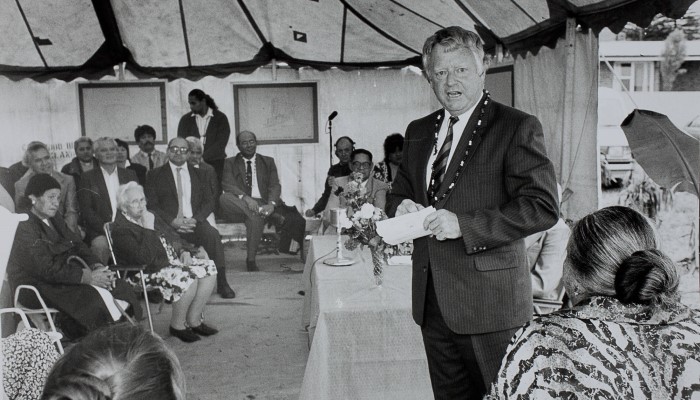
Image: Marae for Cook Islanders, Māngere, 1991 by [unkown]. Collection: Auckland Libraries Heritage Collections Footprints 03495.
Keywords
Here is a list of some keywords based on the history of decolonisation of the Pacific Island states. Use this list when searching the collections and websites in this entry.
Decolonisation: A process where colonies such as Samoa and Fiji became independent of colonial countries like Britain, France and New Zealand.
Samoa: Western Samoa (now Samoa) became independent of New Zealand in 1962. A Treaty of Friendship was signed in the same year to strengthen political and economic relations between the two countries.
Cook Islands and Niue: Both nations became colonies of New Zealand in 1901. The Cook Islands gained independence in 1965 and Niue in 1974.
Nāuru | The Republic of Nauru: The island nation gained independence from Australia in 1968. It exported phosphates to New Zealand and Australia.
Nuclear testing: After World War One, the United States, France and Britain tested nuclear weapons in the Pacific Region. New Zealand played an important role in protests against nuclear tests in French Polynesia.
Seasonal employment: The Recognised Seasonal Employer scheme introduced in 2007 allowed thousands of workers from the Pacific Islands to work in horticulture and viticulture on short-term contracts in New Zealand.
World War One: Men from the Cook Islands, Niue and other island territories enlisted with the New Zealand Expeditionary Force (NZEF).
Peacekeeping: New Zealand Defence Force troops were sent on a peacekeeping mission in 1997 to Bougainville. In 1999 New Zealand was again part of the International Force East Timor (INTERFET) to help restore peace and security in East Timor.
Fiji: A British colony from 1874, Fiji became independent in 1970. New Zealand advocated for democracy in Fiji when the country was taken over in 2006 by military commander Voreqe (Frank) Bainimarama. General elections were held in December 2022.
Climate change: New Zealand supports its Pacific neighbours in calling for urgent action in the face of the climate crisis. In recent years New Zealand started the Climate Change Programme to build resources and systems to support Pacific communities against the impacts of climate change.
Tips: Before searching it can be useful to come up with a list of words to use. These are sometimes called keywords or search words. They can be the name of a person, place, or event you are researching. You can leave out small words like ‘the’ and ‘of’ and just choose the main ones, eg 'peacekeeping'. We can always change our keywords or add more if we need to.
Tips: Also keep in mind that there are different names or spellings for words. Or they could have changed over time.
Auckland resources
Here are some collections from Auckland Libraries and other reliable Auckland based museums and heritage websites. They will help you find books and information on New Zealand's post-colonial relationship with its Pacific neighbours.
Auckland Libraries Catalogue
This catalogue from Auckland Libraries will help find books on Aotearoa New Zealand and Auckland's histories.
Search the catalogue using keywords like 'mau movement' or 'decolonisation Pacific'.
You can get fewer results by using the filters under Refine by.
Select a book that interests you.
Go down the page to Edition information to check if the book can be borrowed or if it's for In library use only.
Look down the page to Related Resources to find other titles related to this search.
If you have an Auckland Libraries card, you can request the item be sent to your local library.
Tips: If the status of the book is 'In library use only', it means the book can only be used in the library and can't be taken home. In this case you will need to fill out a form or speak to a librarian about reading the book in the library.
Tips: You will find lots of books that have been written over 50 years ago. While they are good sources of information, we need to remember the context and time from when they were written.
Kura — Photographs
Browse photographs, illustrations and works of art from the 1800s to the present day.
Use the keywords 'nuclear' to find the image Protest yacht, Beachlands, 1995.
This image is about the protest against French nuclear tests at Mururoa atoll in the Pacific Ocean.
Try the words 'Nauru phosphate'.
The image Official visit, Ōtāhuhu, 1969 is about a visit from the President of Nauru to the Challenge Phosphate Company in Ōtāhuhu in New Zealand.
Tips: Always remember to check the copyright or usage rights of images. This will tell you if you need permission to use the image, and how to attribute the image.
Heritage et AL
This is the blog for Auckland Libraries. It includes articles by library staff about Auckland's history and items from their collections.
The search words 'Pacific Islands' will bring up Pacific Immigrants in the ‘Greater Ponsonby’ region.
This blog is about Pacific Island workers employed in manufacturing in Auckland.
Also, read Pacific Islanders in the First World War about why men from Niue fought in World War One.
Tips: Blogs can be good for looking at how things have continued or changed over time. Remember, stories can be told in different ways so it’s helpful to look at multiple information sources to find different perspectives.
Tāmaki Paenga Hira | Auckland War Memorial Museum
This is one of New Zealand's significant heritage libraries. It has pictorial and art, Māori and Pacific, natural, social, and history collections. It is a great place to visit and check out exhibitions and galleries about topics involving Aotearoa New Zealand's histories.
Use the search feature at the top of the page to enter 'Tuvalu'.
Select the tab Stories to read Tino Tuvalu i Aukilani (Tuvaluans in Auckland).
Look down the page to find Tuvaluans in Auckland.
This is a story about Tuvaluans who came to Auckland as a part of a work-scheme between Tuvalu and New Zealand, and their ability to retain their identity, culture and language in Aotearoa.
Tips: Websites that have .com or .co in the address can have good information, but you need to assess how reliable it is. Check the About us link on the website, if you can find one. That can tell you what the company’s mission and values are.
General New Zealand resources
The websites below belong to government agencies, national museums, archives, libraries, and other reliable sources. They will help find information on New Zealand's post-colonial interests and presence in the Pacific Islands.
Te Ara: The Encyclopedia of New Zealand
Te Ara is an excellent starting point for all questions about Aotearoa New Zealand. If we look down to the bottom of the page, we can see that the website belongs to the Ministry for Culture & Heritage, so the information is well-researched and reliable.
Go to Topics and choose Pacific peoples.
Select Pacific islands and New Zealand to read about Aotearoa's peacekeeping efforts in the Pacific region and post-independence relationships with countries like Samoa and Nauru.
You can also go to the search box at the top of the page and enter the word 'decolonisation'.
Select the article Decolonisation and representation in the Pacific.
NZ History
NZ History is another great website from the Ministry for Culture & Heritage, so the information is well-researched and reliable. It has information about people, places and events from the history of Aotearoa New Zealand.
Go down the page to Politics and Government, then look under New Zealand and the world.
Explore New Zealand in Samoa.
Use the contents on the right to guide you through New Zealand's colonial control of Samoa, the Mau campaign, and Samoan independence.
Archives New Zealand | Te Rua Mahara o te Kāwanatanga
Archives New Zealand preserves and protects official records, documents and data and makes them available to the people of Aotearoa.
Look for Discover our stories from the tabs at the top of the page.
You will find a story called The rise of the Mau and the fall of colonial rule in Sāmoa.
This story includes images taken from the Archives New Zealand collection.
Tips: We like sites like this because they’re reliable. You can tell because of their web address – they have either .govt or .ac, meaning they are from government or educational organisations. They’re also New Zealand sites, so relevant for us.
DigitalNZ
DigitalNZ searches online resources from New Zealand libraries, museums, universities and government sites in one place. It groups results by the type of information and has lots of primary sources.
Use the search box to enter the words 'nuclear protests Pacific'.
Watch the videos A Nuclear Free Pacific and Mururoa 1973.
Go to the tab called Images to view posters and badges protesting nuclear testing in the Pacific Ocean.
Tips: Websites that have .org or .net in the address can have good information, but you need to assess how reliable it is. Check the About us link on the website, if you can find one. That can tell you what the organisation’s mission and values are.
Ngā Taonga Sound & Vision
Funded by the Ministry for Culture and Heritage, the website is New Zealand’s audio-visual archive. Their collection includes film and television, radio and sound recordings, props, posters and more from over 120 years of New Zealand’s history.
Enter the keywords 'peacekeeping East Timor'.
Select View or listen online now from the filters on the left of the page.
Watch the video A job well done.
It is about the role played by Aotearoa in bringing security to the people in East Timor.
In the same way, enter the words 'Samoan independence' to find the audio [SAMOAN INDEPENDENCE]. 1960-10-12.
thecoconet.tv
Aimed at New Zealand's Pacific Island community, the website has lots of cultural and historical information, including songs, stories, news, videos etc.
The keywords 'Recognised Seasonal Employer' will lead to the article Samoan seasonal workers leave for employment in New Zealand this week.
Next, go to the tab Coco Docos, then look down the page to find a link to Untold Pacific History. The videos explore New Zealand's impact and relationships with Pacific people.
Watch Untold Pacific History - Episode 3: Samoa / NZ's colonisation of Samoa & the Mau Movement.
Look for Tales of Time and read the story about The Matua that carried many first-generation Pasifika families to New Zealand between 1935 to 1970.
New Zealand Foreign Affairs & Trade | Manatū Aorere
This Ministry advises the New Zealand government on foreign and trade policy. You will find information on New Zealand's international relationships on this website.
Use the search bar to enter the words 'Treaty of Friendship'.
Select the link About Samoa to read about the Treaty of Friendship signed in 1962 soon after Samoa gained independence.
Also, use the tab Countries and regions to find Australia and the Pacific.
Explore any of the Pacific nations to read about New Zealand's relationship with countries in the Pacific region.
Books
You can also visit your local public library for books on Auckland and Aotearoa New Zealand histories. Listed below are a few titles to help you with your search for books on this topic:
Mau: Samoa's struggle against New Zealand oppression by Michael Field
The decolonisation of Niue by Terry M. Chapman
Niue and the Great War by Margaret Pointer
The future of Tokelau: decolonising agendas, 1975-2006 by Judith Huntsman and Kelihiano Kalolo
Mission to East Timor by Glyn Harper
Winding up the British Empire in the Pacific Islands by W. David McIntyre
SCIS no: 5496689
More about Auckland
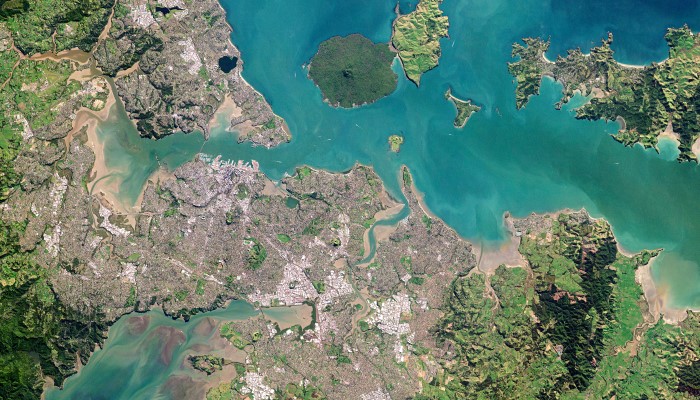
Local iwi
There are many iwi with ancestral relationships to Tāmaki Makaurau. This page lists iwi and websites which have information about their histories.
Learn about local iwi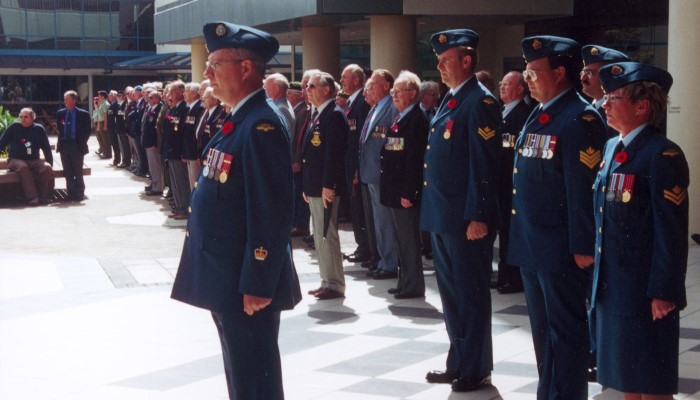
Changing views on conflict
This entry recommends resources to find out how New Zealand's involvement and views of conflict have changed over time, and how wars are commemorated. It also looks at New Zealand's work with the United Nations and current ideas of national identity.
Learn about changing views on conflict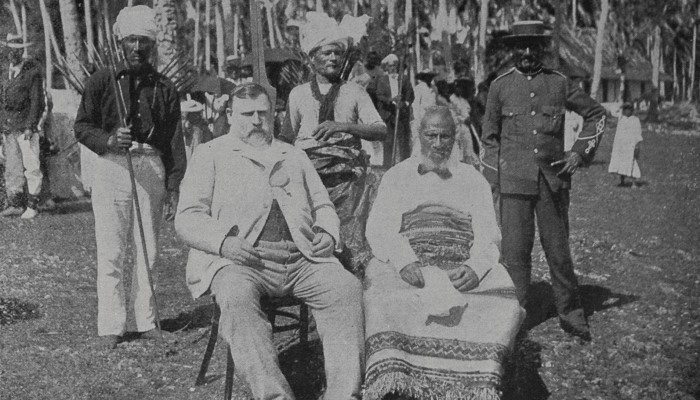
Colonial power in the Pacific
This entry has collections and websites to help explore the history of New Zealand's presence and colonial power in the Pacific. It has examples of the rise of independent Pacific nations and how they sustained their culture and presence in the Pacific.
Learn about colonial power in the Pacific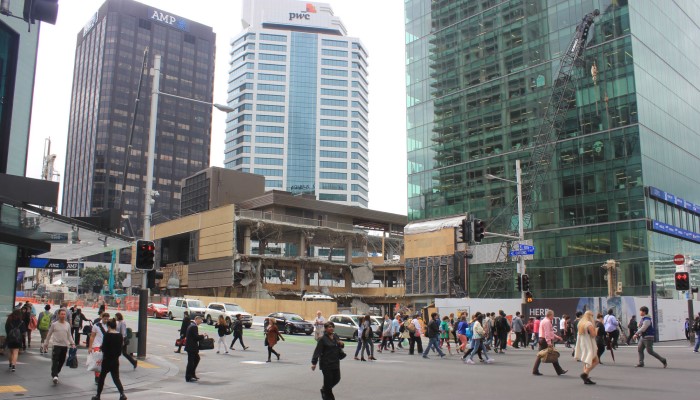
Economic independence and vulnerability
This entry will help you find information about the history behind Auckland's economic progress and independence, and the factors that impacted it.
Learn about economic independence and vulnerability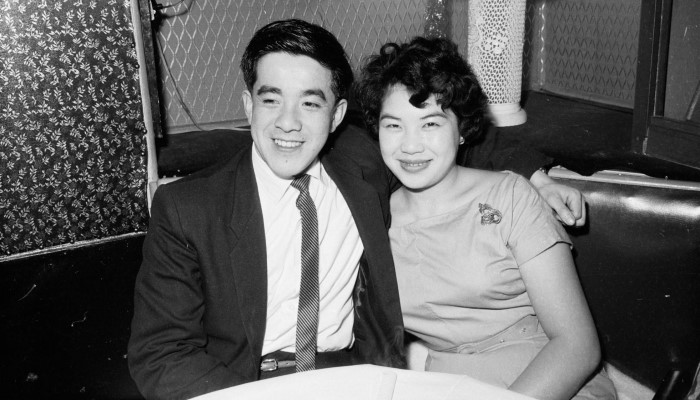
Finding a place in Aotearoa New Zealand
Since the 1700s, new people have immigrated to Aotearoa. Some came in search of a better way of life or because their country was no longer safe. Newcomers could experience racism and discrimination. They also helped shape New Zealand as a country.
Learn about finding a place in Aotearoa New Zealand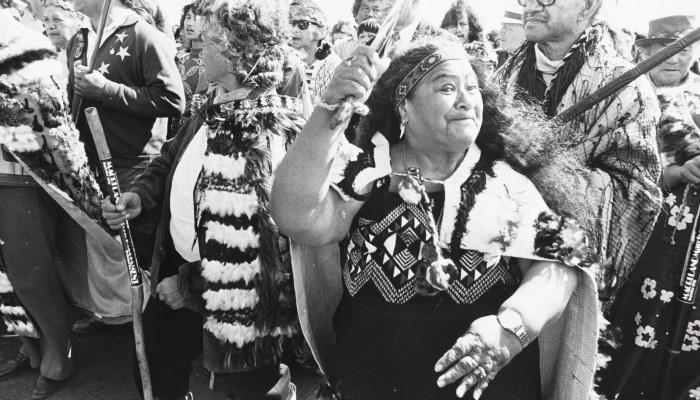
Mana in Māori society
This entry has websites to help you understand the different meanings of mana and its importance in political, social and traditional relationships in Māori society.
Learn about mana in Māori society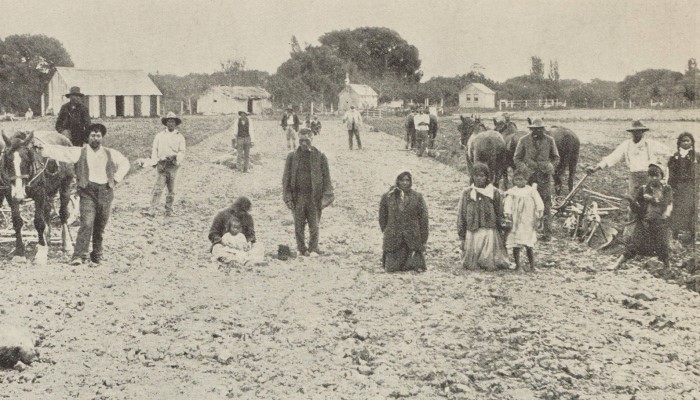
Māori economy: opportunities and challenges
This entry will help you find the best websites and databases that explore the history and development of the Māori economy including the challenges Māori faced from the New Zealand Wars, land sales and decisions made by the Native Land Court.
Learn about māori economy: opportunities and challenges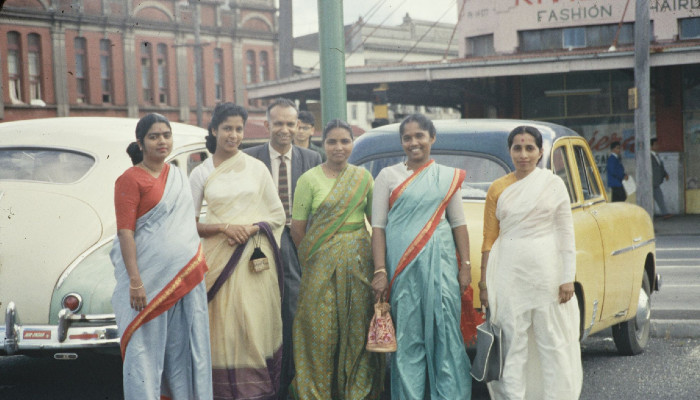
Peopling the colony: inclusion and exclusion
This entry recommends places to find information about the history of immigration to Tāmaki Makaurau and New Zealand. This includes immigration laws and changes, the role of Māori in immigration, and the government's attempt to set right past injustices.
Learn about peopling the colony: inclusion and exclusion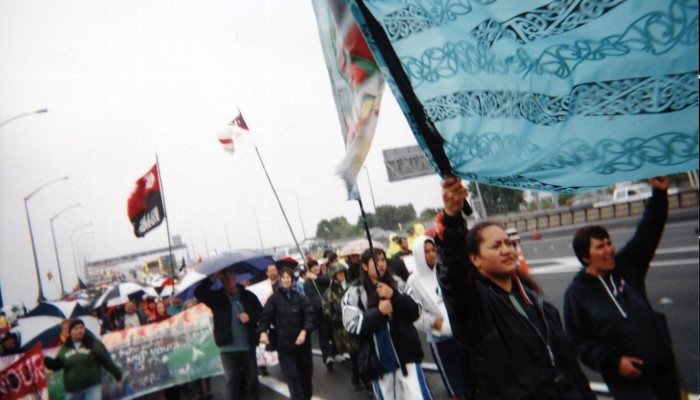
Sovereignty vs rangatiratanga: wars, laws and policies
This entry recommends websites where you can find information about the impacts of land laws on Māori, the New Zealand Wars, and attempts by Māori to find justice and build a relationship with the Crown.
Learn about sovereignty vs rangatiratanga: wars, laws and policies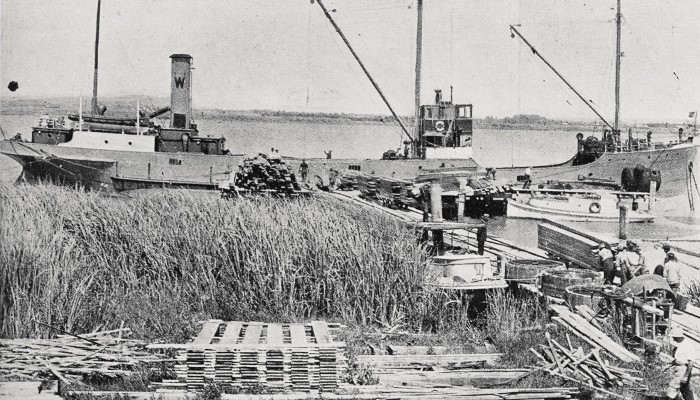
Technology and economic development
This entry will help you understand how advances in technology and land acquisition developed Auckland's economy but greatly impacted Māori and their economy.
Learn about technology and economic development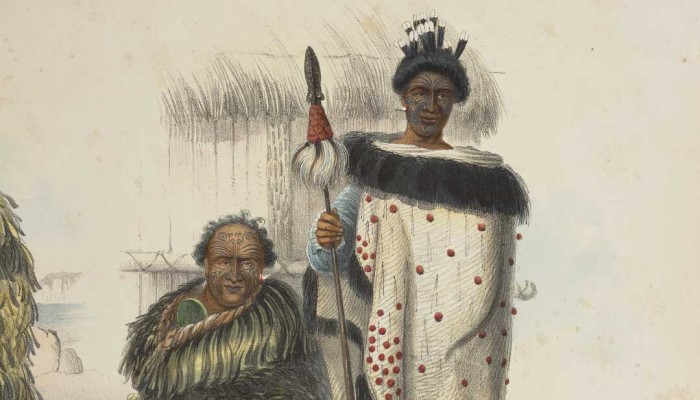
Te Tiriti o Waitangi
This entry recommends websites and collections to find information about He Whakaputanga o te Rangatiratanga o Nu Tireni | The Declaration of Independence and the Treaty of Waitangi | Te Tiriti o Waitangi, their significance, and the signatories.
Learn about te Tiriti o Waitangi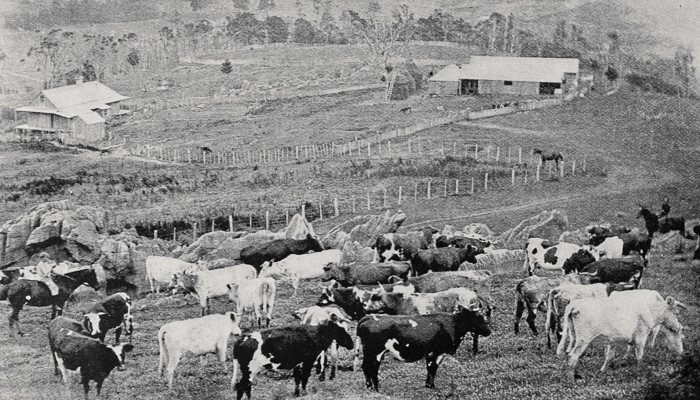
Transforming environments
This entry explores changes made by settlers to Aotearoa's natural environment, their naming of places and features, and efforts to conserve and restore its natural beauty.
Learn about transforming environments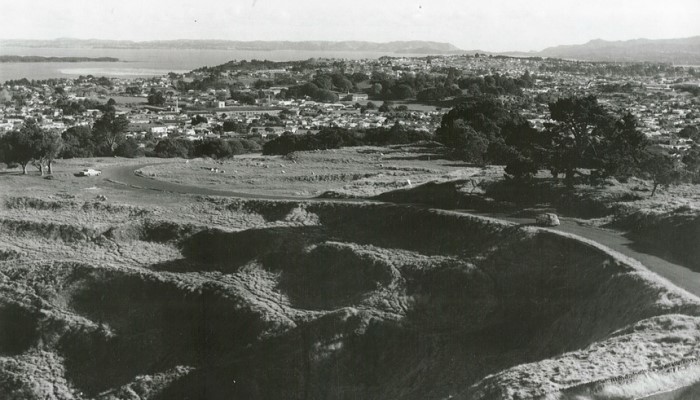
Transforming te taiao
This entry will help you find information on the changes made to the environment by pre-European Māori, and their care and connections to te taiao (the natural world).
Learn about transforming te taiao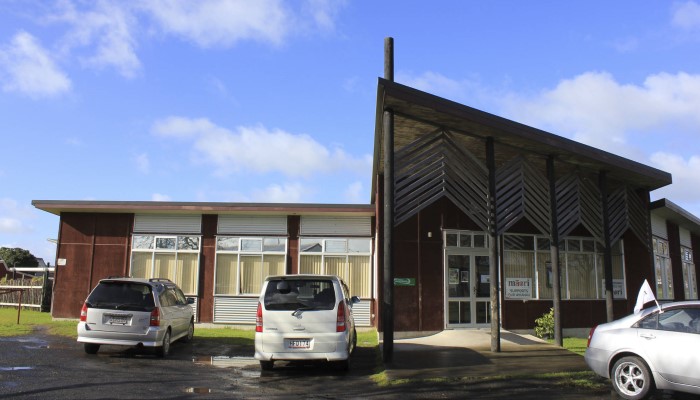
Urbanisation and being Māori
This entry will help you find information about Māori migration to cities, their challenges, and what this meant for their identity as Māori. You will also find information about some protests Māori were involved in to challenge political and social ideas.
Learn about urbanisation and being Māori
